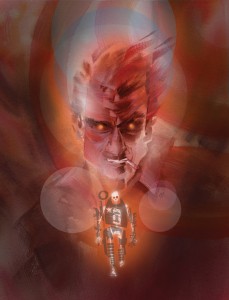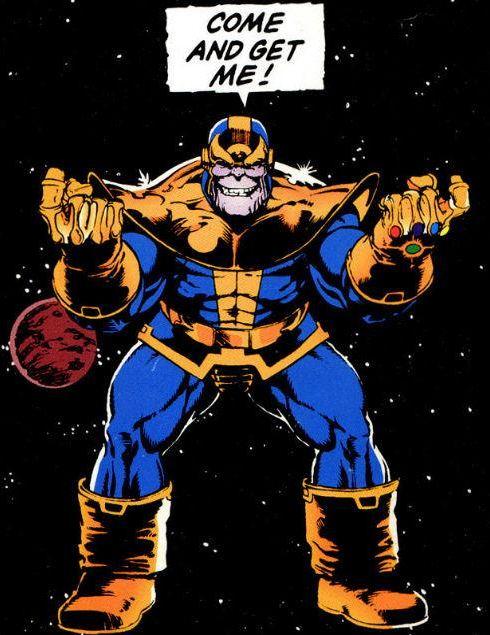
In this week’s Comic Revolt, I spent time talking with Steve Niles about the never-ending story that seems to be his life and career in comics. The man has more comics in the works than most writers have produced in a career.
He has made a name for himself by doing great work on his own terms while maintaining a strong work ethic that started back in his youth. A part of the DIY punk scene in Washington D.C., he took in a lot just by taking a look around at what was happening around him.
“It has a lot to do with what I was raised around too,” he says. “I completely grew up in Washington D.C. in the eighties, which was just a giant DIY music scene. Everybody around me put on their own shows, put out their own records. There wasn’t anything about going out and getting signed with a label or anything like that.”
The distinguishing feature of D.C. at the time was about making your scene. Bands like Minor Threat and Fugazi were setting up their own shows and releasing their own records. That approach rubbed off on Niles when it came to making music and comics.
It wasn’t that it was frowned upon,” he says. “We just never thought about it. That’s what I was saying about the eighties. I didn’t really think about trying to sell myself to other publishers at first. The first thing I learned was how to publish myself.”
There’s an inherent charm in Niles’ ground up approach with his enthusiasm for building something on your own and getting it out to the masses. His appreciation for this ethic runs deep, and he has a lot of respect for people making something out of nothing.
 “Some of my favorite stuff in the world has been produced that way,” he says. “Everybody always asks me what my favorite DIY project is, and I say Night of the Living Dead. George Romero in 1968 got like $70,000 and went out and made a movie…George Romero is one of the greatest DIY stories out there.”
“Some of my favorite stuff in the world has been produced that way,” he says. “Everybody always asks me what my favorite DIY project is, and I say Night of the Living Dead. George Romero in 1968 got like $70,000 and went out and made a movie…George Romero is one of the greatest DIY stories out there.”
In large parts, the need to continually create is what drives Niles, but he also has a pragmatic approach towards stacking his deck when it comes to keeping busy and constantly putting his work out there. Like the horror stories he writes, there is a fear of the unknown pushing him.
“Half of its just that freelancer thing that I’m just horrified of not knowing what I’m doing in six months,” he says. “A lot of it’s just, you’ve got to juggle a lot of stuff just to get the bills paid these days. I used to be able to focus on one or two series and just try to get some stuff. Just getting the rent paid, I’ve got to juggle a lot of things these days.”
In a lot of ways, his creator-owned approach takes on different challenges and dimensions in comparison to working for a major publisher like DC or Marvel. There remains a constant pressure to continually come up with fresh ideas, which is the inspiration and bane of many writers.
“You’ve got to create your own work all the time, so it makes it a little harder to relax,” he says. “Relaxing is not something I’ve ever been all that good at anyway. You’ve just got to constantly keep stuff going hoping something will take.”
Being his own boss also has a cost. When it comes to producing his own projects, he has to be his own marketing and PR division. There’s no safety net or big publisher with a big advertising budget to back him up. Niles must get out there and sell himself.
“That’s what I have been doing for years, and I think I’m a lot quieter than I used to be, but that’s a big part of it,” he says. “You’ve got to get out there and sell yourself constantly. It never stops. It’s a little easier today with all the social networking stuff, but it’s really time consuming because I spend half the time writing and half the time just selling myself.”
Despite the dearth of projects he continually produces, Niles hasn’t let his quality taper off in the slightest. If anything, he keeps pushing the boundaries of experimentation through various projects and collaborations in style and medium. His recent release of Criminal Macabre: Iron Spirit with Scott Morse is an interesting merger of prose and art.
“I’ve been wanting to do that for so long…it only breaks into traditional comics on the very last page,” he says. “I’ve been wanting to do that a lot more to sort of mix words and pictures more. Scott Morse is just kind of perfect for that.”
 Interestingly, Iron Spirit’s unique style and blend of words and art came about quite naturally for Niles. Cal McDonald, the spooky detective of Criminal Macabre, started out being written in prose.
Interestingly, Iron Spirit’s unique style and blend of words and art came about quite naturally for Niles. Cal McDonald, the spooky detective of Criminal Macabre, started out being written in prose.
“Scott and I did a sampler book that was just like the same size and dimensions and page as Iron Spirit,” he says. “I gave one of those to Mike Richardson (Dark Horse Comics founder), and he just said we should do a comic book like this. It turned into it really quick because I just sat and wrote some prose, which is where I started with Cal.”
A fan favorite, Cal McDonald has been a hot topic with Niles writing a crossover event between his Criminal Macabre character and 30 Days of Night, his acclaimed vampire series from IDW. Despite his popularity, there’s been some difficulty getting Cal the big screen treatment.
“We’ve been working trying to get Cal off the ground for a long time now, but we’ve come really close a couple of times, and now we’re back in that cycle again just talking to studios,” he says. “For a long time, Universal had been sitting on it, so we got it back from Universal, and now we’re just starting the whole process over again.”
Most writer’s would have their hands full navigating the logistics of writing multiple titles while trying to develop movies projects for their stories, but Niles still makes time for other undertakings despite their scope. Consider his recent involvement in getting Black Mask Studios off the ground.
“It’s coming along okay,” he says. “Right now, it’s one of those situations we’re dealing with which is exactly how do we raise enough money to support these projects. Matt (Pizzolo) has been focusing on the Occupy Comics, and then I’m developing a thing with Chet Zar.”
While not running full steam yet, the venture is gaining traction as the group tries to apply some business sense to developing projects in the hopes of finding a receptive audience that will allow them to continue to produce exceptional work.
“We want to get that going, but we’re not in a huge rush right now either just because we want to make sure we do it right,” he says. “It’s a completely different market, so it’s kind of hard to second guess what people are going to want. We’re just working on it and moving things forward slowly.”
Then there’s his other big project Creator Owned Heroes with writer Jimmy Palmiotti that has gained a lot of notice in a short period of time. Social media has helped Niles and Palmiotti communicate with a large contingent of readers that are really enjoying the series.
“We’re just pounding away at it, he says. “It was funny because we started off with really great numbers. I was shocked. So now, numbers have sort of settled to where I expected, so what we’re dealing with right now appears to be, it’s really strange because we’re getting a lot more attention from fans – readers, but retailers are not ordering.”
 A lot of that has to do with Diamond Distribution, the prodigious amount of product being pushed by the Big 2 of DC and Marvel, and limited shelf space in comic shops.
A lot of that has to do with Diamond Distribution, the prodigious amount of product being pushed by the Big 2 of DC and Marvel, and limited shelf space in comic shops.
“It’s the usual problem,” he says. “People are constantly calling us and saying they can’t get it from Diamond (Distributors) and this and that. We’re dealing with that. We’re just trying to promote the shit out of it and try to get some people there, but I’m really happy with the way the whole thing worked out…Jimmy (Palmiotti) has really done the most of the heavy lifting on this.”
With all of the different stories and titles Niles has out right now, you would think his quota has been filled, but he has at least a half dozen more things in the works that I could rattle off, and it still wouldn’t cover everything he’s working on. It all comes back to how he came up in D.C. by learning to do it himself.
One of the key things to come out of his experiences with the DIY culture of D.C. was to focus on what you wanted and not let anything get in his way. If you wanted to connect with people, find what matters to you and get it out there.
“The wealth is in the work, and not to be completely fucking hokey, but aside from getting the rent paid and getting my ass fed, the real reward is just getting all the stuff out there,” he says. “Whether it’s music, or movies, or comics or novels, or whatever. It just feels great to make the stuff yourself and get it out to readers. I learned that very early on from guys like Ian (MacKaye). I was just a teenager when I met those guys. The impression that the scene left on me has lasted my whole life.”

















Awesome interview! Steve is one of my very favorite creators in the entire industry.
Thanks. He was a pleasure to interview and is one of the true good guys in the industry.